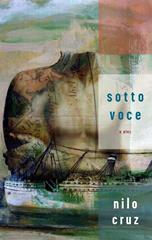
Cover design by Lisa Govan.
“If the sea were to shout,
we would all be deaf.”
– Carlos Fuentes, “Destiny and Desire”
“Sotto Voce: A Play”
Nilo Cruz
TCG Books
Theatre Communications Group, New York, 2016
$14.95
Available: http://www.tcg.org/; https://www.amazon.com/; and other purveyors of fine dramatic literature.
Review by Kitty Drexel
(New York, NY) Sotto Voce is a three person (two women, one man) play about the ways we harness our fears to confront the past and understand our consequential future. Playwright Cruz’s prose lilts off the tongue like a lover’s kiss. His character interactions sweep the stage of the imagination like poetry: gentle, unrushed but intense. Yet, his script is not without its thematic and dynamic problems. With the exception of two German characters revealed in flashback, these individuals manipulate each other with little compassion.
Bernadette Kahn (no relation to Madeline Kahn) is a prolific writer living with acute agoraphobia. She is seduced by Sasquiel Rafaeli, a student and stalker, who will not relent his attentions until she divulges her memories involving the true story of the voyage of the St. Louis (a tragic story that the reader can educate themselves on. It turns out that the US has never been kind to immigrants). Bernadette will not leave her apartment nor invite Sasquiel in. She physically interacts with Sasquiel via her housekeeper of ten years, the recently divorced, romantically bleeding Lucila Pulpo. In dreamlike sequences, Bernadette and Sasquiel are emotionally intimate through the use of internet technologies.
I had to disconnect from the socio-political attachments in order to truly enjoy this play. As a feminist I had to ignore Sasquiel and Lucila’s frequent victim blaming and disregard for Bernadette’s boundaries. “No means no” in this play only when Sasquiel and Lucila feel like it. Yet, it would have been entirely out of character for Lucila or Sasquiel to accept Bernadett’s wishes to be left alone. They needed her in order to live out their own fantasies: Sasquiel needs Bernadette’s memories; Lucila needs the attentions of an attractive man. In the end, even Bernadette succumbs to the fantasy of reliving a past love. These broken characters use each other for their own means. It is impossible to determine who is the more dysfunctional.
This play is for mature audiences only. The sexy talk is not graphic in nature but the content is such that youths or immature adults (or prudes) will be uncomfortable reading or watching. For example, this play discusses the realistic fantasies of mentally skewed adults. These characters obsess like children. The disconnect between acceptable social behaviors and what is dreamt is severe to a degree of potential harm to others. Their fantasies aren’t meant to be realized. It takes a self-aware adult to understand this.
Nilo Cruz captures gorgeous visuals with his writing. His depictions of emotional intimacy, whether they be in the imaginary streets of NYC or on the streets of pre-WWII Berlin, are glorious. He grants florid prose to characters western (white) society least expects. It is a heavy play that requires, out of respect, more than one reading at a time. Actors of color interested in new monologues will find several selections worth chewing over in auditions.
Lastly, this play passes the Bechdel test.
From the July 5, 2016 TCG Press Release: “Nilo Cruz is the author of the Pulitzer Prize-winning Anna in the Tropics, as well as Beauty of the Father, Two Sisters and a Piano, Lorca in a Green Dress, Dancing on Her Knees, Night Train to Bolina and other works.
For over 50 years, Theatre Communications Group (TCG), the national organization for U.S. theatre, has existed to strengthen, nurture and promote the professional not-for-profit theatre. TCG’s constituency has grown from a handful of groundbreaking theatres to nearly 700 Member Theatres and Affiliate organizations and more than 12,000 individuals nationwide. TCG offers its members networking and knowledge-building opportunities through conferences, events, research and communications; awards grants, approximately $2 million per year, to theatre companies and individual artists; advocates on the federal level; and serves as the U.S. Center of the International Theatre Institute, connecting its constituents to the global theatre community. TCG is North America’s largest independent trade publisher of dramatic literature, with 14 Pulitzer Prizes for Best Play on the TCG booklist. It also publishes the award-winning American Theatre magazine and ARTSEARCH®, the essential source for a career in the arts. In all of its endeavors, TCG seeks to increase the organizational efficiency of its member theatres, cultivate and celebrate the artistic talent and achievements of the field and promote a larger public understanding of, and appreciation for, the theatre .www.tcg.org.”
